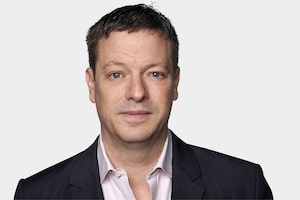Russian opposition leader Alexei Navalny is seen on a screen via a video link from the IK-2 corrective penal colony in Pokrov during a court hearing to consider an appeal against his prison sentence in Moscow, Russia on May 24, 2022.EVGENIA NOVOZHENINA/Reuters
On Sunday, Russian opposition leader Alexey Navalny was released from his latest stint in solitary confinement at Corrective Colony No. 2 in Vladimir Oblast, where he is serving a nine-year sentence on fictitious charges, only to be thrown back into the “hellish closet,” as he described it, a day later.
He used his day of mere imprisonment to throw a big tank of jet fuel onto the raging international debate about the effectiveness of economic warfare as a means to stop Vladimir Putin’s war of imperial conquest.
In a statement, Mr. Navalny called on Canada, the United States and Europe to freeze the bank accounts, seize the foreign assets and remove the international travel rights of those on his foundation’s list of 6,641 Russian government and military officials, oligarchs, bankers, politicians and “propagandists” who have not yet been sanctioned this way – especially the 154 “top oligarchs” he says have evaded embargoes.
“I hate this war,” he declared, “and me and my colleagues are trying to do something to bring it to an end. Putting pressure on Putin’s corrupt elite … the couple thousand families for whose prosperity this regime exists and for whose sake Putin is waging this war … to the point of splitting it is what we need now.”
The question is whether even total economic warfare – the complete isolation of Russian entities and individuals from the world economy – is an effective strategy to counter actual bombs-and-rifles warfare.
The effort to economically isolate Russia, after all, has also hurt the Western world, creating this year’s crises of soaring energy costs and contributing to broader inflation. Meanwhile, higher oil and natural gas prices have boosted Moscow’s foreign-currency reserves. This has led some to claim that the sanctions have backfired.
The history of embargoes and sanctions is decidedly spotty: When they fail, they can embolden autocrats into deeper repression while causing impoverished citizens to turn against the outside world. They are also notoriously hard to enforce – especially, as is the case today, when prominent countries such as China and India won’t participate in them.
On the other hand, Russia is highly vulnerable to the threat of economic isolation. The death of Mikhail Gorbachev this week was a reminder of this vulnerability: It was the spiral of collapsing living standards and declining productivity in the 1970s and early eighties – brought about by the Soviet Union’s self-imposed economic isolation – that led Mr. Gorbachev to implement market-economy reforms, and it was rising debts to foreign lenders, trade deficits and inflation that led the USSR to collapse.
Today, as Mr. Putin attempts to restore a romanticized version of that empire, Moscow is even more dependent on international trade, credit, investment and mobility as a means to finance its war and maintain the middle-class standard of living that provides Mr. Putin with his governing legitimacy.
Since he first invaded Ukraine in 2014, there have been more than 11,000 individual sanctions imposed on Russian individuals, institutions and companies. After the larger invasion began in February, democratic countries agreed to remove Russia from banking, air travel and finance networks and ban all exports to the country. Many countries also agreed to ban tourist visas and – at least eventually – imports of Russian gas and oil.
It represented a level of international democratic solidarity and mutual commitment that many observers – including, it seems, Mr. Putin – did not think possible.
But at this summer’s outset, it seemed to be backfiring. Soaring energy prices appeared to strengthen the ruble and give Moscow a record surplus; its reported economic output actually rose, while living standards declined only slightly. Mr. Putin’s elites kept backing him, and his artillery kept pounding the Donbas.
However, a major study released in early August by a team of economists, led by Jeffrey Sonnenfeld of Yale University, took a closer look. Russia had stopped publishing economic statistics after the invasion, so its claims were hard to check. The economists instead looked at direct local reporting of inputs and outputs by Russian industries – and found a far darker state of affairs.
Export revenues and living standards have apparently fallen more sharply than claimed, they found. Imports – far more important for financing the war – “have largely collapsed, and the country faces stark challenges securing crucial inputs, parts, and technology from hesitant trade partners, leading to widespread supply shortages within its domestic economy.”
As long as democracies maintain their solidarity and resolve over the next year, the economists concluded, those conditions will deteriorate further, the middle class will dwindle, and the resources to continue the war will become unavailable.
That solidarity may be difficult to keep up through a tough European winter. But the study’s findings suggest it is well worth following Mr. Navalny’s advice and imposing a level of economic isolation on Russia’s elites comparable to the physical isolation they have forced upon him.
Keep your Opinions sharp and informed. Get the Opinion newsletter. Sign up today.
 Doug Saunders
Doug Saunders